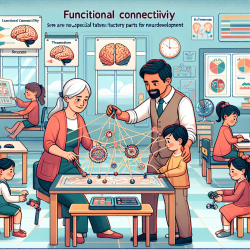Introduction
In the realm of speech-language pathology, data-driven decisions are pivotal for improving patient outcomes. The recent study titled "A structural and functional magnetic resonance imaging dataset of brain tumour patients" provides a comprehensive dataset that can be instrumental in enhancing clinical practices. This blog aims to guide practitioners on how to utilize this dataset to refine their skills and encourage further research.
Understanding the Dataset
The dataset comprises high-resolution structural and functional MRI data collected from 22 brain tumor patients. It includes various imaging protocols such as motor tasks, verb generation, word repetition, and resting state. These data are complemented by demographic information, behavioral results, and direct cortical electrical stimulation data. This rich dataset allows for single-subject analysis, focusing on locating eloquent cortical areas and predicting patient status based on imaging data.
Application in Clinical Practice
For speech-language pathologists, understanding the structural and functional changes in the brain due to tumors is crucial. This dataset provides an opportunity to:
- Identify Eloquent Cortical Areas: By analyzing the functional MRI data, practitioners can pinpoint critical areas related to speech and language, aiding in pre-surgical planning and therapy.
- Predict Patient Outcomes: The dataset allows for the prediction of patient recovery or potential deficits post-surgery, enabling tailored therapeutic interventions.
- Explore Brain Plasticity: The integration of task-based fMRI with resting-state fMRI and DTI network analysis offers insights into brain plasticity and associated behavioral performances.
Encouraging Further Research
While the dataset is a valuable resource, it also highlights the need for further research. Practitioners are encouraged to explore:
- Single-Subject Analysis Techniques: Developing methods to improve the accuracy of identifying eloquent areas in individual patients.
- Comparative Studies: Utilizing the dataset in conjunction with data from healthy volunteers to better understand the impact of brain tumors on speech and language functions.
- Behavioral and Cognitive Assessments: Conducting longitudinal studies to assess the long-term impact of surgical interventions on speech and cognitive abilities.
Conclusion
By leveraging this dataset, speech-language pathologists can enhance their clinical practice and contribute to the growing body of research in neuroimaging and speech therapy. The integration of data-driven insights into therapeutic strategies promises better outcomes for patients with brain tumors.
To read the original research paper, please follow this link: A structural and functional magnetic resonance imaging dataset of brain tumour patients.










